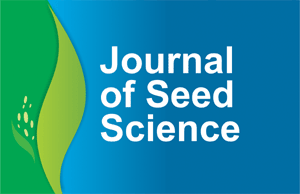Abstract:
Both protein and starch hydrolysis contribute to the effective mobilization of seed reserves to trigger seed germination. We studied the activities of hydrolytic enzymes in germinating seeds of mung bean (Vigna radiata) exposed to cadmium stress at 0, 25, 50, 75, 100 mg.L-1. Exposure to Cd stress decreased the seed germination rate and early seedling growth traits, including root and shoot length and plant fresh and dry biomass compared to control. The adverse effects of Cd were more prominent in terms of shoot length than root length. Seedling α-amylase and protease activities exhibited significant reductions with increasing Cd dose. We also recorded Cd-induced reduction in total soluble proteins and sugars while the concentration of free amino acids exhibited an increase. Above all, a decrease in the hydrolysis process of reserve carbohydrates, proteins and impaired reserve translocation contributed to the inhibition of seedlings’ germination and early growth traits.
Index terms:
α-amylase; cadmium stress; hydrolyzing enzymes; protease

 Thumbnail
Thumbnail
 Thumbnail
Thumbnail
 Thumbnail
Thumbnail


